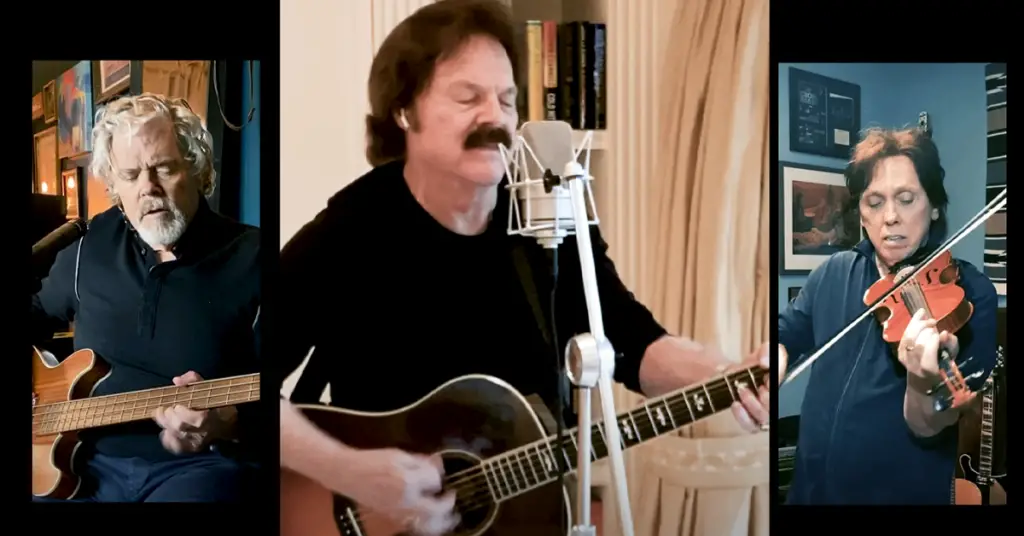The Doobie Brothers – “Black Water”: A Laid-Back Southern Daydream
When The Doobie Brothers released “Black Water” in 1974, they weren’t just cranking out another California rock hit—they were taking a detour down the Mississippi. With its laid-back acoustic vibe, Appalachian harmonies, and a cappella breakdown, “Black Water” became a surprise No. 1 hit and one of the most enduring singalongs in American rock.
Written and sung by Patrick Simmons, the band’s fingerpicking guitarist and occasional lead vocalist, “Black Water” showed a softer, rootsier side of the Doobies—more back porch than biker bar. And it captured something timeless: the simple joy of being unburdened, unhurried, and in tune with the flow of life.
The Sound: Swamp Rock with Soul
“Black Water” opens with the pluck of a gently rolling acoustic guitar—nothing flashy, just a groove that sways like a raft drifting through the bayou. The arrangement is rich but never overdone: dobro guitar, fiddle flourishes, light percussion, and gorgeous vocal layering.
There’s a Dixieland-jam feel to it all, but the production remains crisp and spacious, letting each instrument breathe. By the time the iconic a cappella bridge comes around—
“I wanna hear some funky Dixieland / Pretty mama, come and take me by the hand…”
—you’re all in. It’s pure Americana—equal parts Southern rock, country, gospel, and soul.
The Lyrics: A Love Letter to the South
Though the band hailed from California, “Black Water” is a lyrical postcard from the Deep South, full of riverboats, old plantations, and moonlit rambles.
“Well, I built me a raft and she’s ready for floatin’ / Ol’ Mississippi, she’s callin’ my name…”
The lyrics don’t tell a linear story. Instead, they paint a series of images and feelings—freedom, adventure, a yearning to slow down and soak in the natural world. There’s no rush, no drama. Just a man, a river, and a desire to drift away from the noise of the modern world.
At its core, “Black Water” is a mood song, and the mood is blissful escape.
The Vocals: Harmonies That Hug You
Patrick Simmons’ smooth, unassuming lead vocals are perfect for the song’s easygoing vibe, but it’s the group harmonies that truly elevate it. The Doobie Brothers were masters of vocal blend, and “Black Water” showcases their warm, rootsy harmony work at its finest.
The famous singalong section is now rock legend—not just for how catchy it is, but for how completely it invites the listener in. It’s a chorus made for front porches, festival fields, and road trips with the windows down.
The Journey to #1: A B-Side That Stole the Spotlight
Originally released as the B-side to “Another Park, Another Sunday,” “Black Water” wasn’t expected to be a major single. But Southern radio DJs loved it and started spinning it independently. The public responded, and eventually the label caught on.
In March 1975, “Black Water” hit #1 on the Billboard Hot 100, becoming The Doobie Brothers’ first chart-topping hit—all without a flashy hook or a stadium-rock riff. Just groove, harmony, and heart.
Legacy: A Roots-Rock Classic That Never Fades
“Black Water” has become a staple of classic rock radio and Americana playlists, and remains a beloved part of The Doobie Brothers’ live shows. It’s the kind of song that feels timeless and unforced, a celebration of music for its own sake.
It also paved the way for the more acoustic and soulful directions the band would explore in later years—showing that beneath the amps and anthems, the Doobies could really play—and feel—the blues.

Final Thoughts
“Black Water” isn’t a song you analyze. It’s a song you ride along with.
It asks nothing more of you than to close your eyes, sway to the rhythm, and let go.
It’s music for muddy rivers, slow afternoons, and deep breaths.
And even decades later, when that a cappella kicks in—
You can’t help but sing along.


Facebook Comments